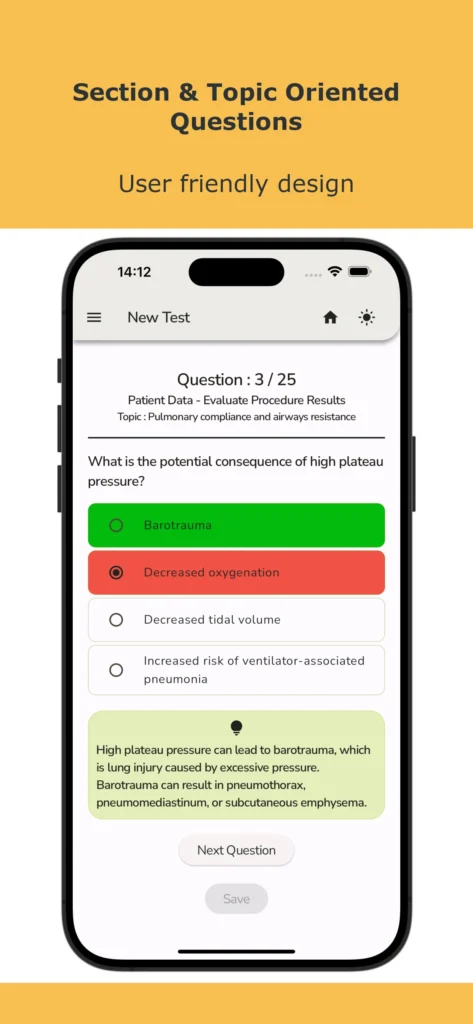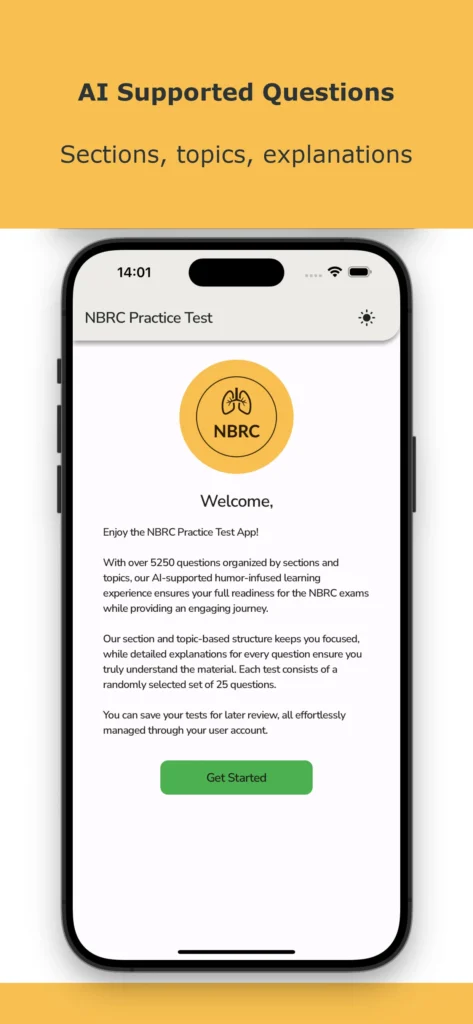Introduction
Welcome to our comprehensive guide on NBRC Continuing Education and the resources and requirements associated with it. Whether you are a respiratory therapist looking to maintain your professional competence or a healthcare professional interested in learning more about the NBRC Continuing Competency Program, this guide will provide you with all the information you need.
The NBRC (National Board for Respiratory Care) is a recognized leader in respiratory care credentialing, providing certifications and continuing education opportunities for respiratory therapists. The NBRC Continuing Competency Program is designed to ensure that respiratory therapists stay up-to-date with the latest advancements in the field and maintain their professional competence.
Throughout this guide, we will explore the various resources available for NBRC Continuing Education and the requirements that respiratory therapists must fulfill to meet the program’s standards. We will also discuss the importance of continuing education in respiratory care and how it contributes to the overall quality of patient care.
The Importance of Continuing Education
Continuing education is a vital aspect of professional growth and development in any field, and the field of respiratory care is no exception. In order to maintain their licensure and stay up-to-date with the latest advancements in respiratory care, respiratory therapists must participate in continuing education programs. The National Board for Respiratory Care (NBRC) recognizes the importance of continuing education and has established the NBRC Continuing Competency Program to ensure that respiratory therapists have access to the resources and requirements necessary to enhance their knowledge and skills.
The NBRC Continuing Competency Program is designed to promote lifelong learning and professional development among respiratory therapists. It consists of a set of requirements that respiratory therapists must fulfill in order to maintain their credentials. These requirements include earning a certain number of continuing education credits, participating in professional activities, and staying current with the latest research and advancements in the field.
One of the primary benefits of participating in continuing education programs is the opportunity to expand one’s knowledge and skills. Respiratory care is a dynamic field, with new research and advancements being made on a regular basis. By participating in continuing education programs, respiratory therapists can stay abreast of these developments and ensure that they are providing the highest level of care to their patients.
Continuing education also plays a crucial role in maintaining the credibility and professionalism of respiratory therapists. By participating in continuing education programs, respiratory therapists demonstrate their commitment to ongoing learning and professional growth. This commitment not only benefits the individual therapist, but also the entire profession by ensuring that respiratory therapists are providing evidence-based, quality care.
In addition to the personal and professional benefits, participating in continuing education programs is a requirement for maintaining licensure as a respiratory therapist. The NBRC requires respiratory therapists to earn a certain number of continuing education credits within a specified time period in order to renew their credentials. Failure to meet these requirements can result in the loss of licensure, which can have serious consequences for a respiratory therapist’s career.
The NBRC provides a variety of resources to help respiratory therapists meet their continuing education requirements. These resources include online courses, webinars, conferences, and workshops. Additionally, the NBRC maintains a list of approved providers of continuing education programs, making it easy for respiratory therapists to find and access high-quality educational opportunities.
In conclusion, continuing education is of utmost importance for respiratory therapists. It not only allows them to stay current with the latest advancements in respiratory care, but also ensures that they are providing the highest level of care to their patients. By participating in continuing education programs, respiratory therapists demonstrate their commitment to ongoing learning and professional growth, while also fulfilling the requirements for maintaining their licensure. The NBRC Continuing Competency Program provides the necessary resources and requirements to support respiratory therapists in their pursuit of continuing education.
Resources for NBRC Continuing Education
As a respiratory therapist, it is essential to stay up-to-date with the latest advancements and best practices in your field. The National Board for Respiratory Care (NBRC) recognizes the importance of continuing education and offers a variety of resources to help you meet your continuing competency requirements.
One of the primary resources provided by the NBRC is the Continuing Competency Program. This program is designed to ensure that respiratory therapists maintain their knowledge and skills throughout their careers. The program consists of various activities, such as attending conferences, completing online courses, participating in research projects, and more.
To fulfill your continuing education requirements, the NBRC offers a comprehensive list of approved providers. These providers offer a wide range of courses and activities that are specifically tailored to the needs of respiratory therapists. You can choose from in-person workshops, online webinars, self-study modules, and other educational opportunities.
In addition to the approved providers, the NBRC also provides a list of approved courses. These courses cover a variety of topics, including respiratory care techniques, patient assessment, ventilator management, and more. By taking these approved courses, you can be confident that you are receiving high-quality education that meets the NBRC’s standards.
The NBRC website is another valuable resource for respiratory therapists seeking continuing education. The website features a dedicated section for continuing education, where you can find information about upcoming conferences, webinars, and other educational events. You can also access online resources, such as articles, videos, and case studies, to enhance your knowledge and skills.
As part of the NBRC’s commitment to E-A-T (Experience, Expertise, Authoritativeness, and Trustworthiness), they collaborate with reputable organizations and experts in the field of respiratory care. This ensures that the content provided through their resources is accurate, reliable, and up-to-date.
To make the most of your continuing education journey, it is important to stay organized and keep track of your activities. The NBRC provides a Continuing Competency Transcript, which allows you to record and document your completed activities. This transcript serves as proof of your continuing education efforts and can be submitted to the NBRC when required.
In conclusion, the NBRC offers a wide range of resources to support respiratory therapists in meeting their continuing education requirements. From the Continuing Competency Program to approved providers and courses, as well as the wealth of information available on their website, respiratory therapists have access to valuable tools for professional development. By actively engaging in continuing education, you can enhance your knowledge, skills, and ultimately provide the best possible care to your patients.
The NBRC Continuing Competency Program
What is the NBRC Continuing Competency Program?
The NBRC Continuing Competency Program is a vital component of the National Board for Respiratory Care’s commitment to ensuring the ongoing competence of respiratory therapists. This program is designed to help respiratory therapists maintain and enhance their knowledge and skills throughout their careers.
As a respiratory therapist, it is crucial to stay up-to-date with the latest advancements and best practices in the field. The NBRC Continuing Competency Program provides you with the resources and requirements to do just that.
Requirements for Participation
In order to participate in the NBRC Continuing Competency Program, respiratory therapists must meet certain requirements. These requirements include:
- Active credential from the NBRC
- Completion of the required number of continuing education credits
- Submission of the required documentation
By meeting these requirements, respiratory therapists can demonstrate their commitment to maintaining their competence and professionalism.
Continuing Education Credits
The NBRC requires respiratory therapists to earn a certain number of continuing education credits to participate in the Continuing Competency Program. These credits can be earned through a variety of activities, including:
- Attending conferences and workshops
- Completing online courses and webinars
- Participating in research projects and presentations
Respiratory therapists can choose from a wide range of topics and formats to earn their continuing education credits, allowing them to tailor their learning to their specific interests and needs.
Documentation and Reporting
Respiratory therapists are required to document and report their continuing education activities to the NBRC. This documentation serves as evidence of their participation in the program and their commitment to ongoing professional development.
The NBRC provides a user-friendly online system for respiratory therapists to submit their documentation and track their progress. This system makes it easy for therapists to stay organized and ensure they meet all the requirements of the program.
Benefits of the NBRC Continuing Competency Program
Participating in the NBRC Continuing Competency Program offers numerous benefits for respiratory therapists. These benefits include:
- Enhanced knowledge and skills
- Professional growth and development
- Increased job opportunities and career advancement
- Recognition of competence and professionalism
By actively participating in the program, respiratory therapists can stay at the forefront of their field and provide the highest quality care to their patients.
Renewing Your NBRC Credentials
Renewing Your NBRC Credentials
Renewing your NBRC credentials is an important step to maintain your professional standing and ensure that you are up-to-date with the latest developments in respiratory care. The NBRC (National Board for Respiratory Care) offers a Continuing Competency Program that provides respiratory therapists with the opportunity to enhance their knowledge and skills through continuing education.
As a respiratory therapist, it is essential to stay current with the latest advancements in the field. The NBRC’s Continuing Competency Program is designed to help you achieve this goal. The program requires respiratory therapists to earn a certain number of continuing education credits within a specified timeframe to renew their credentials.
Participating in the NBRC Continuing Competency Program not only helps you meet the renewal requirements but also allows you to expand your knowledge and expertise. By engaging in continuing education activities, you can stay updated on the latest research, technologies, and best practices in respiratory care.
The NBRC has partnered with various organizations and educational institutions to offer a wide range of continuing education opportunities. These opportunities include workshops, conferences, online courses, and self-study modules. You can choose the activities that align with your interests and professional goals.
When selecting continuing education activities, it is important to consider the relevance and quality of the content. Look for courses and workshops that are accredited by recognized organizations and led by experienced instructors. This ensures that you are receiving accurate and reliable information that will contribute to your professional growth.
As part of the Continuing Competency Program, you will need to earn a specific number of continuing education credits. The exact requirements may vary depending on your specific credentials and the renewal cycle. It is important to review the NBRC’s guidelines and requirements to ensure that you are meeting the necessary criteria.
Once you have completed the required continuing education activities, you will need to document your participation and submit the necessary documentation to the NBRC. This may include certificates of completion, transcripts, or other proof of attendance. It is important to keep track of your continuing education activities and maintain organized records to simplify the renewal process.
Renewing your NBRC credentials through the Continuing Competency Program demonstrates your commitment to professional development and ensures that you are providing the highest level of care to your patients. By staying current with the latest advancements in respiratory care, you can enhance your skills, expand your knowledge, and contribute to the overall improvement of the field.
Conclusion
In conclusion, the NBRC Continuing Education program is an essential resource for respiratory therapists looking to maintain their professional competence and stay up-to-date with the latest advancements in the field. By participating in continuing education activities, respiratory therapists can enhance their knowledge and skills, ensuring that they provide the highest quality care to their patients.
The NBRC Continuing Education program offers a wide range of resources and requirements to meet the needs of respiratory therapists. From online courses and webinars to conferences and workshops, there are various options available for therapists to earn continuing education credits.
The program also emphasizes the importance of lifelong learning and encourages therapists to pursue educational opportunities that align with their professional goals and interests. By continuously expanding their knowledge and staying current with the latest research and best practices, respiratory therapists can enhance their clinical expertise and improve patient outcomes.
To participate in the NBRC Continuing Education program, therapists must fulfill the requirements set by the NBRC. This includes earning a certain number of continuing education credits within a specified time period. Therapists can choose from a variety of activities to earn these credits, including attending educational events, completing online courses, participating in research projects, and more.
The NBRC Continuing Education program also provides a platform for therapists to track their progress and manage their continuing education activities. Through the NBRC website, therapists can access their personal transcript, view their earned credits, and plan their future educational endeavors.
Overall, the NBRC Continuing Education program plays a crucial role in supporting the professional development of respiratory therapists. By providing access to a wide range of educational resources and setting clear requirements, the program ensures that therapists have the necessary tools and opportunities to enhance their knowledge and skills. Through continuous learning and professional growth, respiratory therapists can deliver optimal care to their patients and contribute to the advancement of the field.
For more information about the NBRC Continuing Education program and its requirements, please visit the official NBRC website.








